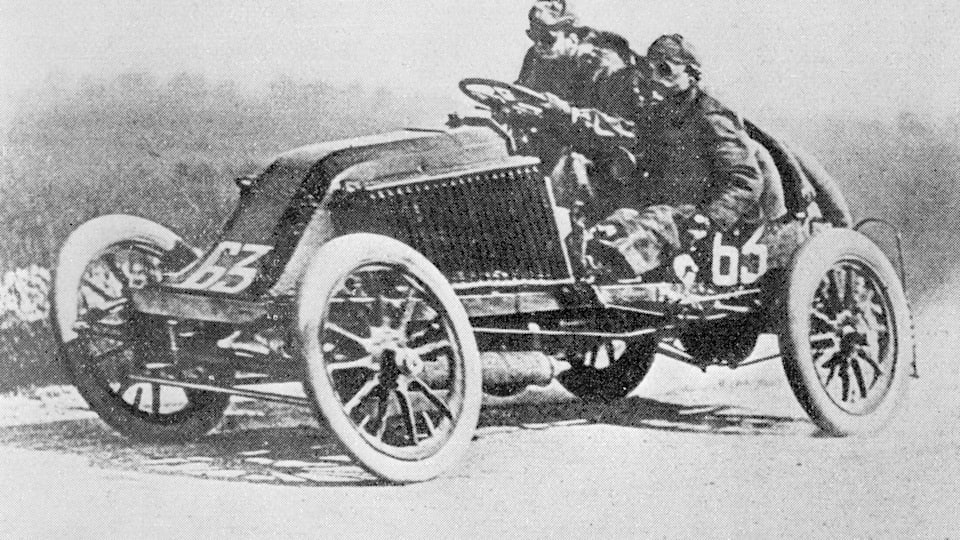Olympics and motorsports: From the sidelines of Paris 1900 to an esports series - a full circle
Although motorsport has not been directly part of the Olympic programme, racing cars and automobiles have not been far away, the latest being an esports series.

The Paris 1900 Olympic Games was held in the backdrop of a seven-month-long world trade fair.
The Exposition Universelle, or the Paris Exposition, was intended to position the French capital as a frontrunner for development and leader of the modern age.
Amid this, a number of events were held, and that included motorsport. Car manufacturers, keen to showcase what they had to offer, participated in the competition.
Most of the car manufacturers entered were French, including Renault, Peugeot, Delahaye, Serpollet, Panhard-Levassor and Huru among others.
The races -- largely a test for mileage and reliability -- were divided in 14 categories, that included six-seater cars, electric taxis, delivery vans and trucks among others. The entry list in each was headlined by the car manufacturer and not the driver.
The Paris-Toulouse-Paris - a popular ‘city to city’ race - was included as a part of the event. It was held on open roads and was a time trial as opposed to opponents racing against each other.
Notably, Louis Renault, one of the founders of the Renault car company, won the Paris-Toulouse-Paris race.
Medals were awarded to the winners but motorsport was not a part of the Olympic programme.
This is because the Olympic Charter prescribes that “sports, disciplines or events in which performance depends essentially on mechanical propulsion are not acceptable.”
Hence, since the race in 1900, motorsport’s association with Olympics was restricted to racetracks that doubled up as a venue for the Games or athletes who loved to drive.
For instance, the Circuit de Barcelona-Catalunya in Spain hosted the first Formula 1 Spanish Grand Prix three months after the Barcelona 1992 Games. The track had hosted the time trial cycling event at the Olympics that year.
Or, take Qatari skeet shooter Nasser Al-Attiyah, a bronze medallist at London 2012, an Asian champion and an Asian Games gold medallist who is also a World Rally Championship and a Dakar Rally race driver.
In 2012, however, things changed a bit. The governing body for motorsports, the Fédération Internationale de l'Automobile (FIA), was officially recognised by the International Olympics Committee that year.
As a member of the IOC's Association of Recognised International Sports Federations (ARISF), the FIA is a part of the Olympic Charter and thus embraces the Olympic spirit.
The first significant step of this recognition came six years later.
Karting at the Youth Olympic Games
Motorsport was included at the 2018 Youth Olympic Games in Buenos Aires, Argentina. An e-karting (electric karting) race was added to the programme as a demonstration event. However, no medals were awarded.
Run against the backdrop of the FIA Road Safety Exhibition and E-Karting Experience, over 500 spectators, including 300 students from local schools, attended the event.
The e-karting race at the Youth Olympic Games was part of FIA karting president Felipe Massa’s efforts to have karting included at the Paris 2024 Olympics. Felipe Massa was a former Formula 1 driver who drove for Sauber, Ferrari and Williams in over 250 races, winning 11 Grands Prix.
Held at the Kartodromo in the Autodromo Juan y Oscar Galvez, the e-karting race featured 12 drivers -- six boys and six girls -- comprising 10 Argentines, a Brazilian and one driver from Chile. Each kart was raced by a pair of one boy and one girl, effectively making it a mixed team event.
A practice and qualifying session were held for the six teams. The Argentinian pair of Franco Colapinto and María García Puig not only managed to claim pole position but also went on to win the race.
Franco Colapinto later went on to compete at the 2021 Le Mans 24 Hours, a prestigious race which is a part of the World Endurance Championship (WEC), in the LMP2 category. He finished 12th overall and seventh in his class.
Olympics and esports racing
In 2021, the FIA and the International Olympic Committee (IOC) joined hands again, this time in the Olympic Virtual Series, launched by the IOC to encourage esports, and engage new and younger audiences. Motorsport was one of the five events of the series.
The motorsport event featured the FIA Gran Turismo Championships, part of the Gran Turismo Sport game certified by motorsports’ governing body.
“You have a steering wheel, you have the pedals, like in a real race car, of course, the speed, the g-force, the feeling of fear, and this kind of things are not there but still, the physical skills are very close to motorsport,” Frederic Bertrand, director of the FIA’s innovative sport projects, told The-Race.com.
There were reportedly 1.4 million entries from over 45,000 different gamers.
The event included a qualification stage in the form of a 10-day time trial challenge. The top 16 gamers from designated regions then made it to the World Finals, which featured three races. The competitor that scored the most points cumulatively in the three races was declared the winner. Valerio Gallo of Italy won the event.
